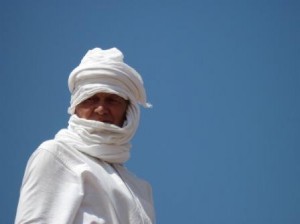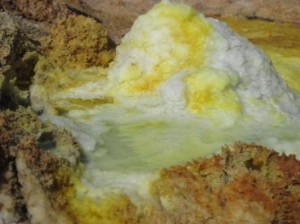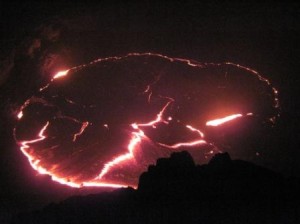Danakil Depression – Ethiopia
by Barbara on Mar.15, 2010, under Published Travel Articles
A VOLCANIC BIRTHDAY (For Marek Bozalek)
Selamta Magazine (Ethiopian Airways) January 2011

It is the second of November 2009; today is my birthday, today I turn sixty. What do the words ‘sixty years old’ mean; a turning point in life, but why, why should I turn anywhere now? I am on a road; it is straight and it twists and I move directly forward or I bend, the road does not curve because I am sixty. Sixty! I am sixty. Should I have a celebratory party, why is it that birthdays need to be partied over, do they have any kind of significance, after all some people do not know the date and year that they were born in, they cannot imagine a celebration; why and when should they hold it? A celebration of life’s in-continuity. Why is age so important, what does it mean?
I wave the flies from the honeyed bread that I hold in my hands, Hamdela, a small village on the edge of the Danakil depression is covered in flies, I do not know where they come from as there is no water for them to drink, I do not know if they celebrate a birthday, possible they celebrate a birthday today for they have honey, to lick and to taste. So I do not think about my birthday, but then I try not to think about things that may disrupt my beliefs, challenge my equilibrium, I do not want to think of my mortality, for this is what a birthday signifies, the movement of time, time, the hands of a clock, they tick, tick, tick, tick, onwards, an end, and then the circle begins again. The pleasure that I experience today, my birthday, is an experience of anticipated loss, I will never be in this space again, I will never have a sixtieth birthday again.
I taste a fly in honey, it tastes like sweetened salty fly, this fly will never have another birthday for as it eats so it is eaten. Do I want to anticipate all that I will loose, an adventure, an excitement, a memory that only I can invent. Yes, for I have this power, I can be immortal, I can celebrate my mortality, if only for one day.
The Danakil Depression, it has always been my desire to go to this place, a place that is fraught with mysterious mythologies. Afar warriors with bones between their nostrils and mud red colours on their fighting clothes, their rebellious verdant cross dresses; my picture thoughts meander to a photograph that Arthur Rimbaud took of the Afar warriors, they smiled as bandits smile and cradled their spears, treasuring their foreignness, he would not sell them guns, they had no money, no gold, just a sexy smile and some thin water lost cattle. And I remember his envy: “Pagan blood returns …. I’ll return with iron limbs, dark skin, an imperious gaze: my mask will mark me as a member of a powerful race.” Even then, before he met these long fierce men, he yearned to be one of them.
And science, the empirical truth of a thing that can never be challenged, science, it fascinates me, it challenges my imagination, an expert knowledge, a truth that I make untruthful, unfaithful. The Danakil Depression is the product of a tectonic triple junction, at the meeting place the spreading ridges that form the Red Sea and the Gulf of Aden emerge on land and meet the East African Rift, these three pieces of the earth’s crust meet at Lake Abbe, a mid ocean ridge on land. This land is alive now, I brush a fly from my eye, a lean goat wanders by and then turns its nose to the air, it smells the wind, it too is alive, it searches for water, but in millions of years the Red Sea will erode the highlands surrounding the Depression and flood the valley, then, in about ten million years, geologists predict that the whole six thousand kilometer length of the East African Rift will be submerged forming a new sea as large, maybe even larger than the Red Sea. Africa will have lost its Horn, water music; I can hear the sound of the trombone.
I can tell you more scientific things about the Danakil, its salt and volcano’s: The lowlands of the Depression are dominated by heat and drought. There is no rain for most of the year; the annual rainfall averages about one hundred and fifty millimeters. Here the Awash River, which flows north-east, provides a narrow green belt, but only one hundred and twenty kilometers away the river ends in a chain of salt lakes where its water evaporates as quickly as it is supplied, sculptures of salt , myriad David’s walk the edge, into the horizon.

The Danakil Depression, the hottest place on earth in a summer month, endless salt and sulphur, a place where the earth’s crust is slowly moving apart, about two centimeters per year along each of the three rifts which form the legs of the triple junction, which means that there is a continuous sequence of earthquakes, fissures hundreds of meters long and as deep open up the ground where molten rock is injected, and these plates, along the dykes, the earth is forced open, the volcano a covetous destructiveness, clefts in the earth, a grave.
But is this what you want to read, this ingenuous accurate science, this pander to the experts of ephemeral experience, it is not this that I came for. I came to push the boat out, to honour the adventure.
A grave, destruction, the death of the land, a shroud made of sea; these words come to me as it is my birthday, my sixtieth birthday. I have lived for a long time, I am alive.
The Danakil is filled with military men; police, soldiers, young boys, the Kalashnikov rifle, the ubiquitous AK47 supported on thin shoulders. This part of Ethiopia is close to the border of Eritrea, that section of the land which is coveted by two different people, where blood is nourishment and war a past time, and so, it is said that tourists need protection, borders to must be protected from marauders that come across from the enemy side, dangerous, maybe, and yet also a form of commerce, the guards that guide you are paid, borders are porous, a visitor, a relative from Eretria overnights in an Ethiopian village, partakes in the coffee ceremony, tells people of their mothers, sons, cousins, a camel caravan from across the border brings gossip, what is new in town, people compare the price of salt, a different price, a different currency, for it is a different country.
We stop at Berhale, the first of our stops, we pick up a policeman and a guide, the policeman and the guide are one and so the policeman brings his brother, and then move onwards to Hamdela where we are to camp for two nights. Hamdela is on the ridge of the depression, sea level not below it, how low is the lowest point of earth? In the village there is also a military presence, militia come out to great us, I look upwards to a hill and there stands a soldier, he scans the landscape for bandits.
It is the day before my birthday, but I want my adventure to start now, it has always begun, but now I wind a white turban around my head and sit on top of the vehicle, alongside three armed guards, they help me as I climb up, they hold me as the vehicle sways, I am a freedom fighter, a photograph of liberty, the edge of my forehead touches the cold metal of a gun as we race along the salt, tracks left in the white follow us, the mark of a bullet in the grain, downwards, down towards the Dallol, as it is called, the sulphur and salt. The car stops, the soldiers brush sweat from upper lips that are hairless, for a moment I do not know where I am, a moonscape, hard under my feet. I walk, tentative, the salt crunches, a moment of truth; far in the distance are mountains, salt mountains. We walk further, small tables, mushroom like are everywhere, gypsum, I sit on one and look around, there is nothing but yellow and white, sharp edges to the table catch at my shirt, it rips, tears, a tear drops from my eye, the salt is bitter and the wind blows. I stand up, lie down, crouch on my haunches, kneel, photograph after photograph, I want to show people where I was, validate my experience, I want the image to remember, a photograph reveals reality that is past, a salty space that is not there. I walk further, the smell of rotten eggs, bubbling springs of sulphur salt, yellow and green, hot, clammy, needle stalactites, ghostly. A dead bird lies on the edge of the liquid; the fumes, he has flown off course, a lost airplane, he cannot navigate in the heat, a wheatear, Isabelline, I pick up his body and honour his funeral pyre.
Later that evening as I sit and yawn and drink boiling tea, heat cools, a young soldier comes to me.
“What is you name?” he asks me.
“Marek”, I reply.
He wants to know who I am for I have requested that early the next day, my birthday, I want to run in the Depression, along the brown white salt, watch the sun rise in the hottest place on earth, for I am a runner. What will I think about when I run, what will I talk about when I talk about running in the Danakil , a memory of age and salt and dying and running on my sixtieth birthday.
Later that evening, the son is low; the leader of the militia comes over to our camp. He speaks to the guide, Fethi Yahya, not to me, for I do not understand Amharic.
“Come to my encampment tonight, all of you, for we want you to join us in the coffee ceremony.”
“Yes,” I say, “that would be fantastic.”
He understands the word ‘fantastic’; he laughs and straightens his camouflage epaulets.
Later than night I walk across the salty sand. A woman pours coffee from an earthenware coffee pot, she throws frankincense into the coals, I eat popcorn. There is talk, a rustling of paper. A young soldier comes to me and hands me a few pieces of lined paper. The words ‘Happy berthday Marek’ are written on them, an outline of a flower. I feel happiness; this is a celebration, a remembrance, a tapestry of history for me to long imagine. And in the morning I run, as I look up at the morning sun and follow the tracks that the car made the day before, I see a soldier on the hillside, he watches me through his binoculars; a car drives a long distance behind me. They guard me; make me safe, for this is a special day.
Later that day we drive to Kursewad, this village is where we start our journey up the mountain, high, far away, close to angels, the active volcano Erta ale.
We drive. There is no road, there are only tracks, but even these are haphazard, they go forward, they go backwards, they go nowhere, they go somewhere. We stop and ask for directions, this way a young boy points, to the east, but it is to the west that his hand is raised, his white shirt blows, a sign of surrender to the elements, a pennant, he owns this land and its harshness; it is unforgiving, dusty and dry. I step out of the car as they talk, I stand next to the skeleton of a camel, an open mouth, rotting teeth, even camels die of thirst out here. We drive onward into the western dust storm, a young girl, her hair braided in the Afar tradition, her cheekbones high, waves to us as we go past, she holds a tired chicken in her arms, she offers it to the moving machine.
A hut ahead, Kursewad, we have navigated the sand correctly. I enter a grass structure and lie down for I am tired. The cook, Gabeba, shakes my shoulder, he hands me a plastic container of rice.
“This is spicy, chilli spice for your birthday,” he says, “a man must be hot.”
A while later, following negotiations with the local militia, we climb into the vehicle and drive to the foot of the mountain. Two camels are to meet us at its base , they will carry my friend and the sleeping equipment over the shards of lava to the summit. The militia who accompanies us, talks to Fethi Yahya.
“He speaks only Arabic,” Fethi Yahya says to me, “but Arabic is similar to Amharic and I have read the Koran so I know and understand what he says.”
The AK47 lies across the man’s knees, it points downwards, purgatory. I hear the word ‘South African’, the militia smiles, he draws a finger across his throat and laughs, then he holds up is hands, the shape of a gun, ratta tat tat, and smiles again.
“Independence”, he says.
His face is creased from the sun, brown lips, his head cloth blows from the window, a bandit from a bandit picture, an Afar warrior, a photograph, menacing and yet he smiles at me for he knows that this is a special day, my birthday.
We arrive at the base of the mountain and wait, and wait and wait, camels take a long time to walk the twenty five kilometres that we have just driven in an hour. As the sun goes downwards a camel caravan passes by, the sacks across their backs are empty, tomorrow they will return this way laden with salt bars, salt for sale. I take another photograph; I will not meet them again. The moon rises slowly, it is a full moon, the neon light of a reflection, it does not hide me as I wait.
The camels arrive, we pack, there are several people who will accompany us across the basalt volcanic stone. We do not need a torch, the moon lights our caravan. The camels look up and spit, I walk over the rock, it is hard on my shoes, I stumble and go on, the bandit guide walks ahead, he does not falter, he knows this mountain, he is sure of foot. Three hours later we arrive at the top, Erta ale. It is ten o’clock.
The militia walks with us to the edge of the crater, the lip of the volcano. There are fumes, there is rumbling, there is acrid steam, clouds of burning earth. The mountain is awake, blue and red, blazing scoriae, Prometheus’s stolen goods; I can feel the eagle thrust its pointed beak into my liver, beads of blood on my forehead, the volcano burns in an underworld, Andy Warhol’s face watches me. I want lean forward, press myself into the gas fumes, feel the ashy vapour, I want to destroy, become destructive. Red and yellow, a porridge that undulates, a great up swelling, a fiery mantle plume, it melts and surges; if ever I believed that there, out there somewhere, there is a god, it is now, I watch a miracle, the centre of the earth seethes.
The militia man points his AK47 towards the invisible stars and presses the trigger, an arc of bullets frame the moon. I am sixty as I watch this fire, I am sixty as I whisper, ‘happy birthday’, I watch what I will loose in the theatre of death.
We cannot stay at the edge of the fire for too long, it is hot and the smoke fumes burn my nostrils. We walk to the edge of the crater so that I can look down into it one more time, then slowly we walk back to where we will sleep. I unwrap a wet towel, my bottle of Moet et Chandon is luke warm for nothing can remain cold in this space, the cork rises and touches a lone planet, earth, it burns, then it is no longer. I pour the pink liquid into plastic cups and light a cigarette for only fire can make me cool.

As the wind swirls and blows the humps of hardened lava around me, I drink the finest champagne that I will ever drink and salute the sky, for the sky will always be older than me, immortal, it will shelter the boiling earth forever, for on this day I sleep in my dream.